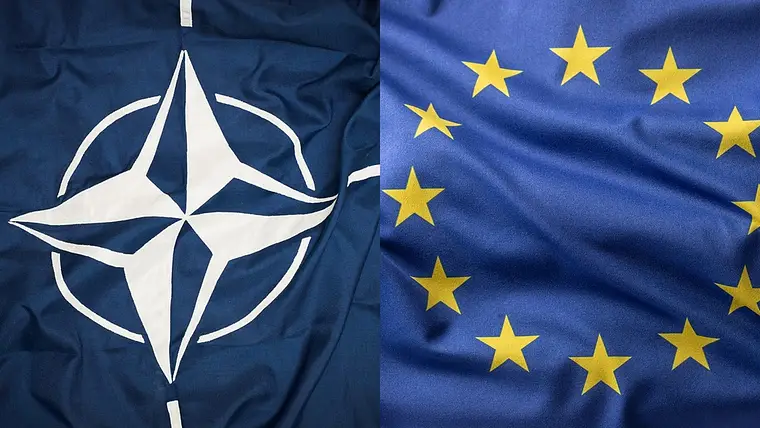Since the European Union (EU) decided to adopt a common defense policy at the very beginning of the 2000s, its relationship with NATO has been marked by ambiguity and misunderstanding. The reason for this can be explained in a few words. Most EU countries fear that European defense could be seen as an alternative to NATO, which would end up irritating and alienating their main security guarantee, the United States, from the continent.
This view of things is far from unfounded. Over the past twenty years, European defense has most often been viewed with suspicion on the other side of the Atlantic, even with outright hostility according to the governments in place in Washington. The problem is that the Americans have never understood what the meaning of this project is or what its ultimate goal is. They never understood it, because the Europeans were never able to explain it to them. How could they have done so, since they themselves do not know where their common defense policy should lead them? But to sort this out, let’s go back to Washington.
The United States denies the Europeans the fact of wanting to launch military cooperation between them, keeping out of their projects the members of NATO who are not part of the EU. They do not understand why the Europeans should start fooling around together, behind the backs of some of their allies, by creating a sub-group which concerns 27 countries out of the 31 members of the Alliance. They cannot conceive of it because they have always perceived the EU as a simple free trade area, and not a political project of integration. The notion of European integration has always eluded them, or at least they have never taken it seriously. European defense thus appears to Washington as a simple military cooperation between sovereign states, which makes it problematic, and perhaps even offensive: why, they wonder, within a circle of sovereign and allied countries, should some of them set themselves apart to strengthen their ties by excluding others?
The Americans are quite right to ask themselves this question. From their point of view, it is more than legitimate, and the Europeans would do well to explain to them what they have in mind. For that, however, they would first have to understand themselves what they want and what they do not want from the “Europe of defence”, as they sometimes call it, forgetting that, etymologically, this expression does not mean much (which is emblematic). Until now, in fact, EU Member States have been careful not to answer the existential questions concerning their common defense policy. However, these are simple: should the “Europe of defence” be considered as a stage in the process of European integration that the EU is supposed to embody, or does it aim more simply to coordinate military policies of the twenty-seven Member States, which are destined to remain distinct and sovereign? In other words, is it a cooperation or integration project?
The fact that Europeans never wanted to settle such an existential question has a name: that of “ constructive ambiguity ”. Henry Kissinger had defined this concept as the deliberate will, on the part of the diplomatic actors involved in a negotiation, to remain vague about the ultimate purpose of the initiative, so that it can move forward despite the differences it arouses. This notion has undeniably had its usefulness in the past. Without it, France and the United Kingdom would probably never have been able to launch European defense in 1998. However, the constructive ambiguity on which European defense is based cannot last forever. Sooner or later it will have to be lifted. In the long term, what is politically ambiguous always ends up fueling misunderstandings which themselves have nothing constructive. And one of these misunderstandings is precisely that of the EU-NATO relationship.
In an era of war in Ukraine and a possible disengagement of the United States from the continent, Europeans must choose. If the “Europe of defence” does not involve their sovereignty, if it is destined ad vitam aeternam to remain disconnected from the process of European integration and not to call national sovereignty into question, then the exclusion of the countries of NATO non-EU members finds no justification. The latter should be able to be associated with it much more widely than they are currently. On the other hand, if European defense represents a stage in the framework of the broader and long-term political project which aims at the political unity of the continent, then the exclusion of the countries which are not concerned by this process of unification finds everything its meaning. And in this case, Defense Europe can legitimately be presented as an initiative aimed at regrouping and rationalizing the twenty-seven fragmented contributions of the countries of the Union to NATO into a single, more coherent and sovereign contribution.
For more than 20 years now, supporters of European defense have been trying to convince their Anglo-Saxon allies that their ambitions are complementary and not in competition with those of NATO. Until they remove the constructive ambiguity that has accompanied European defense for two decades, and until they clarify once and for all, first and foremost to themselves and to the other members of the Alliance in second, what their real intentions are, the misunderstanding will persist. And they will not be able to explain to their Anglo-Saxon friends in what terms and within what limits they can be associated with the various projects they are carrying out within the framework of their enigmatic “Europe of defence”.
This article is originally published on iris-france.org







